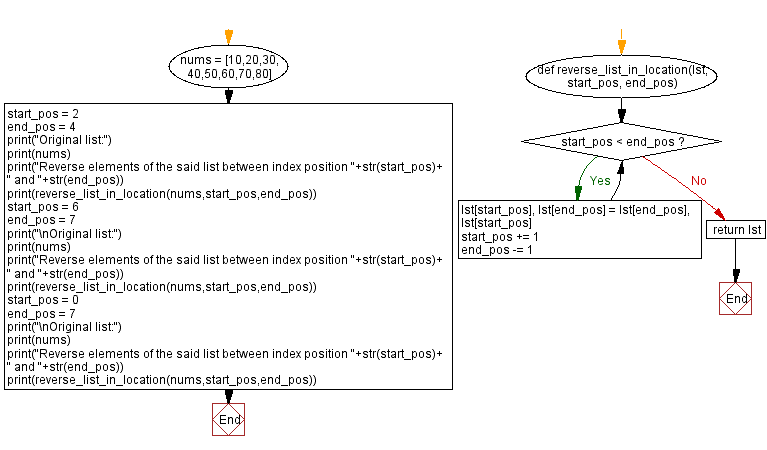Python List Advanced Exercise - Reverse a list at a specific location
1. Reverse List at Specific Location
Write a Python function to reverse a list at a specific location.
Sample Solution:
Python Code:
# Define a function to reverse a portion of a list in place
def reverse_list_in_location(lst, start_pos, end_pos):
# Use a while loop to swap elements from the start and end positions
while start_pos < end_pos:
# Swap elements at start_pos and end_pos using tuple unpacking
lst[start_pos], lst[end_pos] = lst[end_pos], lst[start_pos]
# Move the start_pos towards the end_pos and vice versa
start_pos += 1
end_pos -= 1
# Return the modified list
return lst
# Create a list of numbers
nums = [10, 20, 30, 40, 50, 60, 70, 80]
# Define the start and end positions for the first reverse operation
start_pos = 2
end_pos = 4
# Print the original list
print("Original list:")
print(nums)
# Print a message indicating which portion of the list will be reversed
print("Reverse elements of the said list between index position " + str(start_pos) + " and " + str(end_pos))
# Call the reverse_list_in_location function and print the result
print(reverse_list_in_location(nums, start_pos, end_pos))
# Define the start and end positions for the second reverse operation
start_pos = 6
end_pos = 7
# Print a message indicating which portion of the list will be reversed
print("\nOriginal list:")
print(nums)
print("Reverse elements of the said list between index position " + str(start_pos) + " and " + str(end_pos))
# Call the reverse_list_in_location function again and print the result
print(reverse_list_in_location(nums, start_pos, end_pos))
# Define the start and end positions for the third reverse operation
start_pos = 0
end_pos = 7
# Print a message indicating which portion of the list will be reversed
print("\nOriginal list:")
print(nums)
print("Reverse elements of the said list between index position " + str(start_pos) + " and " + str(end_pos))
# Call the reverse_list_in_location function once more and print the result
print(reverse_list_in_location(nums, start_pos, end_pos))
Sample Output:
Original list: [10, 20, 30, 40, 50, 60, 70, 80] Reverse elements of the said list between index position 2 and 4 [10, 20, 50, 40, 30, 60, 70, 80] Original list: [10, 20, 50, 40, 30, 60, 70, 80] Reverse elements of the said list between index position 6 and 7 [10, 20, 50, 40, 30, 60, 80, 70] Original list: [10, 20, 50, 40, 30, 60, 80, 70] Reverse elements of the said list between index position 0 and 7 [70, 80, 60, 30, 40, 50, 20, 10]
Algorithm: reverse_list_in_location(lst, start_pos, end_pos) function
Input: A list “lst” and two integers start_pos and end_pos indicate the start and end positions of the sub-list that needs to be reversed.
Output: The input list “lst” with the sub-list from start_pos to end_pos reversed.
Steps:
- Initialize two variables start_pos and end_pos to the start and end positions of the sub-list.
- While start_pos is less than end_pos do the following:
- Swap the elements at start_pos and end_pos
- Increment start_pos by 1
- Decrement end_pos by 1
- Return the list lst.
Flowchart:

What is the time complexity and space complexity of the following Python code?
def reverse_list_in_location(lst, start_pos, end_pos):
while start_pos < end_pos:
lst[start_pos], lst[end_pos] = lst[end_pos], lst[start_pos]
start_pos += 1
end_pos -= 1
return lst
Time complexity - The time complexity of the code is O(n), where n is the difference between "end_pos" and "start_pos". Due to the swapping of two elements at each iteration, the while loop iterates n/2 times. Therefore, the time complexity of the while loop is O(n/2), which is equivalent to O(n).
Space complexity - The space complexity of the code is O(1) because the algorithm modifies the input list in-place without creating any new data structures. As a result, the function uses the same amount (constant) of space regardless of the size of the input list.
For more Practice: Solve these Related Problems:
- Write a Python function that takes a list and an index, then returns a new list with the portion after that index reversed.
- Write a Python function to reverse only the elements between two specified indices in a list.
- Write a Python function to reverse the sublist starting from a given index to the end of the list in-place.
- Write a Python function that reverses every segment of a list separated by a specific delimiter value.
Go to:
Previous: Python List Advanced Exercise Home.
Next: Length of the longest increasing sub-sequence.
Python Code Editor:
What is the difficulty level of this exercise?
Test your Programming skills with w3resource's quiz.
